Monthly Archives: May 2018
 My niece, Andrea Spicer is a person who is known for her caring, generous nature. She is always willing to help or a friend or family member in need. Once when a friend of hers left her wallet in a restaurant while they were traveling, Andrea offered to take her all the way back the next day and she would have done it too, but the group decided to turn around and go back right away. This kind of act is not foreign to Andrea, but is rather is something that Andrea is well known for. It doesn’t matter if she’s at work or with friends. Andrea has a caring heart and she lets everyone know that she is there for them.
My niece, Andrea Spicer is a person who is known for her caring, generous nature. She is always willing to help or a friend or family member in need. Once when a friend of hers left her wallet in a restaurant while they were traveling, Andrea offered to take her all the way back the next day and she would have done it too, but the group decided to turn around and go back right away. This kind of act is not foreign to Andrea, but is rather is something that Andrea is well known for. It doesn’t matter if she’s at work or with friends. Andrea has a caring heart and she lets everyone know that she is there for them.
Andrea has worked for the last couple of years at the Turnbuckle Lounge in the Best Western Hotel. She is a cook there and everyone who is are there agrees that she is a great cook and an easy employee to get along with. She lives her job and in reality has always been very interested in cooking. She loves serving people her creations and the watching them enjoy the food she has made. It is another way that her caring nature can come out. Sometimes, showing people how much we care, is displayed in the nutritious food we make for them. 
Of course, the most important thing in Andrea’s life is her son Topher. He is her reason for getting up every day. He is her reason for doing her best in everything she does. Topher puts a smile on her face with his sweet ways, and his silly sense of humor. He makes he smile and he makes her laugh. Topher is, in many ways, Andrea’s best friend. They love to do things together, because they are very close. Sometimes, I think that Andrea, like most parents can’t believe that Topher is becoming a grown up young man, but he is. Time refuses to stand still, and Topher is almost a teenager, but he is. For Andrea, it has been a wonderful life. Today is Andrea’s birthday!! Happy birthday Andrea!! Have a great day!! We love you!!
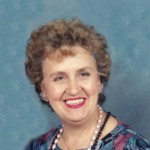 In church today, our pastor talked about how moms can become invisible to their children. Of course, he was talking about how we can take them for granted, but there is another way that our mom can become invisible…at least to us here. When your mom goes to Heaven and you can no longer see her, or talk to her. While she is no longer with us here on earth, that doesn’t mean her love for us ends. Love will endure forever. She was the one who carried us in her womb for nine months, and then brought us into this world. She nurtured us through life, and helped us to become independent people, who can take charge of our own lives.
In church today, our pastor talked about how moms can become invisible to their children. Of course, he was talking about how we can take them for granted, but there is another way that our mom can become invisible…at least to us here. When your mom goes to Heaven and you can no longer see her, or talk to her. While she is no longer with us here on earth, that doesn’t mean her love for us ends. Love will endure forever. She was the one who carried us in her womb for nine months, and then brought us into this world. She nurtured us through life, and helped us to become independent people, who can take charge of our own lives.
I’m sure there were many times when we took her for granted, and didn’t give her the respect she deserved, but she always forgave us for our thoughtlessness. In her wisdom, she knew that we really didn’t mean it. Still, our words must have hurt…our actions must have stung. Nevertheless, Mom forgave and didn’t hold it against us. I’m sure some of them us were much more of a challenge than others, and I place myself in that category, because I think I had the ability to be a trial sometimes…and I think I might be putting that somewhat mildly. Still, that doesn’t mean that I did not care about my mom, but rather that her daughter was stubborn. Mom always forgave me anyway, and for that I consider myself blessed. Our moms taught us what it meant to be parents…the need to forgive our kids for the stupid things we did. We learned parenting from our parents after all, and much of the nurturing qualities come from our mothers. Where would our kids be without our mothers to show us how to be mothers. We learned it from her.
Still, over those years, we have all taken our moms for granted. We didn’t really see them. They were a fixture in our lives. They performed a function, but we were seldom grateful. Then, when they are suddenly gone, we 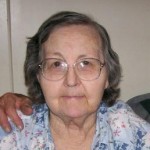 finally get it. We realize that they quietly took care of all the needs of our lives. They took a back seat so that we could shine. They cooked and cleaned, and received no thanks from us. We sassed them and disrespected them, and even though we may have said we were sorry, we could not take those things back. They were forever out there. Then, for some of us, the day came when they left this earth and we learned what it was like without that wonderful person that we had taken so much for granted…viewed as invisible…whether we realized it or not. For us, invisible took on a whole new meaning where our mother was concerned. I was blessed in this life to have a wonderful mom and mother-in-law, and both of them are invisible to me now. They are in Heaven, but they will never be forgotten. Happy Mother’s Day in Heaven to my two moms. I love and miss you both.
finally get it. We realize that they quietly took care of all the needs of our lives. They took a back seat so that we could shine. They cooked and cleaned, and received no thanks from us. We sassed them and disrespected them, and even though we may have said we were sorry, we could not take those things back. They were forever out there. Then, for some of us, the day came when they left this earth and we learned what it was like without that wonderful person that we had taken so much for granted…viewed as invisible…whether we realized it or not. For us, invisible took on a whole new meaning where our mother was concerned. I was blessed in this life to have a wonderful mom and mother-in-law, and both of them are invisible to me now. They are in Heaven, but they will never be forgotten. Happy Mother’s Day in Heaven to my two moms. I love and miss you both.
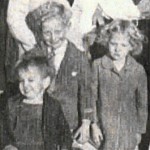
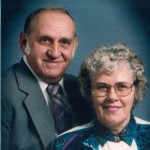 My uncle, Larry Byer was the older of the three middle children of my grandparents, George and Hattie Byer, and a part of the three musketeers that included my mom, Collene Spencer and their brother, Wayne Byer. Uncle Larry was the older of the only two boys in the family, and with my mom in the middle, the three of them were into mischief a lot. While they were in trouble a lot, they were also best friends and allies. If one was in trouble the others tried to help…unless their mom was going to spank them, because they learned early on that you just didn’t mess with their mom.
My uncle, Larry Byer was the older of the three middle children of my grandparents, George and Hattie Byer, and a part of the three musketeers that included my mom, Collene Spencer and their brother, Wayne Byer. Uncle Larry was the older of the only two boys in the family, and with my mom in the middle, the three of them were into mischief a lot. While they were in trouble a lot, they were also best friends and allies. If one was in trouble the others tried to help…unless their mom was going to spank them, because they learned early on that you just didn’t mess with their mom.
Uncle Larry worked at the Texaco refinery for many years, and when they closed down, he was not at retirement age yet, so he took a transfer to New Orleans, Louisiana. He and Aunt Jeanette were gone for a number of years, and the whole family missed them, but several family members took the opportunity to visit them and had a great time in New Orleans. Uncle Larry and Aunt Jeanette treated each of their guests to the best the city had to offer. My parents took the opportunity to visit, and had a great time…once they got used to the heat. While they enjoyed every visit, I’m sure their favorite visitor, other than their children and grandchildren, was his mother. Grandma Byer went to visit, and they gave her the royal tour. The pictures of their visit were memories that Grandma would never forget. When the family went through Grandma’s things, they found he pictures of her visit among her things. They pictures were great, and you could tell that they both fully enjoyed the visit. It was one neither of them would ever forget.
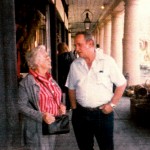

Uncle Larry and Aunt Jeanette were still living in Louisiana when Grandma became ill, but she wanted to say goodbye to all of her children before she went home. She waited until Uncle Larry got home before she passed away. I know that Uncle Larry was always thankful that he made it home…and so was Grandma. Now both of them are together in Heaven, and I know that they are having a great time. Today is Uncle Larry’s birthday. He would have been 84 years old. Happy birthday in Heaven, Uncle Larry. We love and miss you very much.

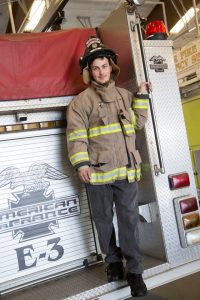 A fireman…it seems to be the every little boy’s dream, and my grandson was no exception, but what has made him the exception is the fact that he has gone through all the training to actually become a fire fighter, and he never faltered. Josh began his journey while he was still in high school. He was in his element…immediately. Josh had some wonderful mentors along the way, all of whom made this dream interesting and who confirmed his destination. They helped Josh to know that his dream was the right dream for him.
A fireman…it seems to be the every little boy’s dream, and my grandson was no exception, but what has made him the exception is the fact that he has gone through all the training to actually become a fire fighter, and he never faltered. Josh began his journey while he was still in high school. He was in his element…immediately. Josh had some wonderful mentors along the way, all of whom made this dream interesting and who confirmed his destination. They helped Josh to know that his dream was the right dream for him.
Through the Boces program, Josh started his studies while he was still in high school, and then has continued his studies as a full time college student, achieving his Associates Degree in Fire Science in one year of full time college instead of two. His is looking forward to continued study to become a Paramedic, and he will also be looking into getting hired by one of the local fire departments. He is so excited about that prospect that he can hardly wait. I suppose it is the 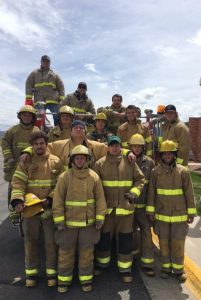 same with any course of study. You have learned the things you need to know for your career, and now you are just itching to get at it. That is exactly where Josh is right now…standing on the threshold of his future.
same with any course of study. You have learned the things you need to know for your career, and now you are just itching to get at it. That is exactly where Josh is right now…standing on the threshold of his future.
I have always known that Josh would make a great fire fighter/paramedic, because of the aptitude he displayed as a young boy helping to take care of his great grandparents. He was very meticulous, gentle, and caring. When Josh was helping, they always felt at ease, knowing that he would follow directions exactly and would always be careful with them. Josh has always had a heart for caregiving, and firefighter/paramedic falls right in line with caregiving, so as a career choice, it makes perfect sense. Today is the culmination of Josh’s dream and hard work, as he graduates with an Associates Degree in Fire Science. Congratulations Josh!! We are so proud of you and all your hard work!!
 My niece, Jessi Sawdon began her working career in the legal field, as a runner in an attorney’s office. Most kids don’t really have that opportunity so early on, but Jessi was blessed and she was a great employee. She continued on in the legal field until the attorney she was working for at the time retired, and then she decided that it was time for a change, so she went back to school. She has been studying, and together with her husband, Jason and been raising their little girl Adelaide. Being a stay-at-home mom has been very important to Jessi since the birth of her little girl, so I’m sure that going back to college to start a new career was little bit scary too…mostly wondering what a job would bring as far as her mommy life was concerned.
My niece, Jessi Sawdon began her working career in the legal field, as a runner in an attorney’s office. Most kids don’t really have that opportunity so early on, but Jessi was blessed and she was a great employee. She continued on in the legal field until the attorney she was working for at the time retired, and then she decided that it was time for a change, so she went back to school. She has been studying, and together with her husband, Jason and been raising their little girl Adelaide. Being a stay-at-home mom has been very important to Jessi since the birth of her little girl, so I’m sure that going back to college to start a new career was little bit scary too…mostly wondering what a job would bring as far as her mommy life was concerned.
Today, with her studies behind her, Jessi has achieved her Associates Degree in Human Communications, and just started a new job as the Marketing Coordinator for Hinge Studio Marketing and Communications. The business is owned by two of her very good friends, Kerstin and Leah, and the really good news is that Jessi will be working from home. There is nothing better that to have bosses who are also your  good friends, and who understand your needs and are willing to work with you to make your mutual dreams come true. I think there are a number of people who would love to be in Jessi’s shoes when it comes to their job, because you don’t have to give up your time with your children for your job. Now I call that working it out!!
good friends, and who understand your needs and are willing to work with you to make your mutual dreams come true. I think there are a number of people who would love to be in Jessi’s shoes when it comes to their job, because you don’t have to give up your time with your children for your job. Now I call that working it out!!
Today, with commencement upon her, Jessi is looking forward to marching with her class to receive her degree, and we are all so very proud of her. The studies are behind her now, and it is smooth sailing ahead. Jessi, we are all so proud of you and of all the hard work you have do to achieve your goal. Now with a new career ahead of you, the best is yet to be. Congratulations on your graduation, Jessi!! We love you!!

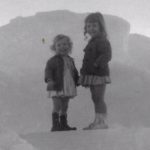 My older sister is without doubt, one of the nicest people I know. She is always careful of peoples feelings, and is generous to a fault. If she can help someone, she will help them. Cheryl is just a very caring person. She gave up much of her time to take care of our parents when they were ill, and often takes her youngest granddaughter, Aleesia for the evening, so that her parents can go to the summertime activities in downtown Casper with their sons. I’m sure that one day Aleesia will choose to go with them, but he loves her grandma very much and loves spending time with her.
My older sister is without doubt, one of the nicest people I know. She is always careful of peoples feelings, and is generous to a fault. If she can help someone, she will help them. Cheryl is just a very caring person. She gave up much of her time to take care of our parents when they were ill, and often takes her youngest granddaughter, Aleesia for the evening, so that her parents can go to the summertime activities in downtown Casper with their sons. I’m sure that one day Aleesia will choose to go with them, but he loves her grandma very much and loves spending time with her.
Cheryl is a legal secretary for Williams, Porter, Day and Neville legal firm, and works for one of the busiest attorneys there, often working late hours to get everything done that needs to be done that day. She is very good at her job, and the attorney she works for has said that he would be lost without her, and really wishes 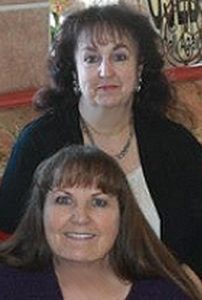 she could see her way clear to refusing such things as vacation, because it is a real hardship for him when she is gone. Nevertheless, he has to persevere, because everyone needs a vacation.
she could see her way clear to refusing such things as vacation, because it is a real hardship for him when she is gone. Nevertheless, he has to persevere, because everyone needs a vacation.
Cheryl is a big fan of old movies or chic flicks, and so every Thursday night, she and I go to dinner with her daughter, Liz, and then we go back to her house and watch a movie. She and I don’t always agree on what makes a good movie, but usually we do. She has pretty good taste in movies…once you get away from things like “The Sound of Music” anyway. I know she would roll her eyes at me on that one, but there are just some shows that I can’t get into. Nevertheless, she got me going on the “Love Comes Softly” series, and “Sarah, Plain and Tall,” both of which I really enjoy. That sister time is really important to both of us, as we are very close, and we like to keep it that way. We have been good friends (and sisters) all our lives, and we don’t see any reason to change that now. Today is Cheryl’s birthday. Happy birthday Cheryl!! Have a great day!! We love you!!
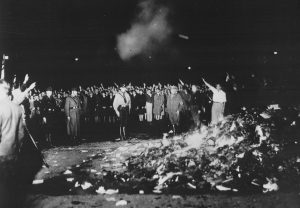 Book burning is the ritual destruction by fire of books or other written materials. This practice is usually carried out in a public place, so as to further destroy any sense of control of one’s own life. The burning of books represents an element of censorship and usually proceeds from a cultural, religious, or political opposition to the materials in question. Sometimes those burning the books think they are “protecting” the people from something they deem to be evil, but more often, the books simply don’t agree with the agenda of the controlling group. Such was the case with the most famous book burning, which took place under the Nazi regime on May 10, 1933. The May 1933 book burning in Nazi Germany was preceded in nineteenth century Germany. In 1817, German student associations (Burschenschaften) chose the 300th anniversary of Luther’s 95 Theses to hold a festival at the Wartburg, a castle in Thuringia where Luther had sought sanctuary after his excommunication. The students were demonstrating for a unified country. Germany was then a patchwork of states. During the protest, the students burned anti-national and reactionary texts and literature which the students viewed as “Un-German” in nature or content. I wonder if they had any idea that the freedom to protest was the very thing they were looking to take away in the future Germany.
Book burning is the ritual destruction by fire of books or other written materials. This practice is usually carried out in a public place, so as to further destroy any sense of control of one’s own life. The burning of books represents an element of censorship and usually proceeds from a cultural, religious, or political opposition to the materials in question. Sometimes those burning the books think they are “protecting” the people from something they deem to be evil, but more often, the books simply don’t agree with the agenda of the controlling group. Such was the case with the most famous book burning, which took place under the Nazi regime on May 10, 1933. The May 1933 book burning in Nazi Germany was preceded in nineteenth century Germany. In 1817, German student associations (Burschenschaften) chose the 300th anniversary of Luther’s 95 Theses to hold a festival at the Wartburg, a castle in Thuringia where Luther had sought sanctuary after his excommunication. The students were demonstrating for a unified country. Germany was then a patchwork of states. During the protest, the students burned anti-national and reactionary texts and literature which the students viewed as “Un-German” in nature or content. I wonder if they had any idea that the freedom to protest was the very thing they were looking to take away in the future Germany.
Then, in 1933, Nazi German authorities, decided to synchronize professional and cultural organizations with Nazi ideology and policy (Gleichschaltung). Nazi Minister for Popular Enlightenment and Propaganda, Joseph Goebbels, spearheaded an effort to bring German arts and culture in line with Nazi goals. The government began to remove cultural organizations of Jewish and other officials who were alleged to be politically suspect or who performed or created art works which Nazi ideologues labeled “degenerate.” Goebbels also had a strong ally in the National Socialist German Students’ Association (Nationalsozialistischer Deutscher Studentenbund), so he used them to bring the literary phase into being. German university students were at the forefront of the early Nazi movement, and in the late 1920s. Many of them filled the ranks of various Nazi formations. The ultra-nationalism and antisemitism of middle-class, secular student organizations had been intense and vocal for decades. After World War I, many students opposed the Weimar Republic (1919–1933) and found in National Socialism a suitable vehicle for their political discontent and hostility.
On April 6, 1933, the Nazi German Student Association’s Main Office for Press and Propaganda proclaimed a nationwide “Action against the Un-German Spirit,” to end in a literary purge or “cleansing” (Säuberung) by fire. Local chapters were to supply the press with releases and commissioned articles, offer blacklists of “un-German” authors, sponsor well-known Nazi figures to speak at public gatherings, and negotiate for radio broadcast time. Then, in a symbolic act of ominous significance, on May 10, 1933, university students burned upwards of 25,000 volumes of “un-German” books, presaging an era of state censorship and control of culture. On the evening of May 10, in most university towns, right-wing students marched in torchlight parades “against the un-German spirit.” The scripted rituals called for high Nazi officials, professors, university rectors, and university student leaders to address the participants and spectators. In Berlin, some 40,000 persons gathered  in the Opernplatz to hear Joseph Goebbels delivered a fiery address: “No to decadence and moral corruption!” He went on to say, “Yes to decency and morality in family and state! I consign to the flames the writings of Heinrich Mann, Ernst Gläser, Erich Kästner.” Among the authors whose books student leaders burned that night were well-known socialists such as Bertolt Brecht and August Bebel; the founder of the concept of communism, Karl Marx; critical “bourgeois” writers like the Austrian playwright Arthur Schnitzler; and “corrupting foreign influences,” among them American author Ernest Hemingway. I don’t agree with some of these writings, but I also don’t agree with their destruction. People can make up their own minds.
in the Opernplatz to hear Joseph Goebbels delivered a fiery address: “No to decadence and moral corruption!” He went on to say, “Yes to decency and morality in family and state! I consign to the flames the writings of Heinrich Mann, Ernst Gläser, Erich Kästner.” Among the authors whose books student leaders burned that night were well-known socialists such as Bertolt Brecht and August Bebel; the founder of the concept of communism, Karl Marx; critical “bourgeois” writers like the Austrian playwright Arthur Schnitzler; and “corrupting foreign influences,” among them American author Ernest Hemingway. I don’t agree with some of these writings, but I also don’t agree with their destruction. People can make up their own minds.
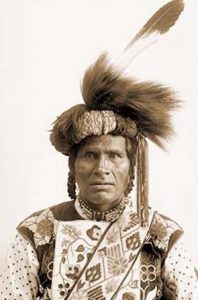 Many people think of the Indians as, well…simply the Indians, whether we intend to or not. I suppose that if we studied the different tribes, their noticeable differences would become very apparent, but if we don’t it’s not so easy to tell them apart. One of the lesser known tribes, at least early on in American history, was the Chippewa tribe. Speculation is that they were already settled in a large village at La Pointe, Wisconsin at about the time that America was discovered. Then, in the early 17th century, they abandoned this area. Many of them returning to their homeland in Sault Sainte Marie, Michigan, while others settled at the west end of Lake Superior, where they were found by Father Claude Jean Allouez, a Jesuit missionary and French explorer, in 1865.
Many people think of the Indians as, well…simply the Indians, whether we intend to or not. I suppose that if we studied the different tribes, their noticeable differences would become very apparent, but if we don’t it’s not so easy to tell them apart. One of the lesser known tribes, at least early on in American history, was the Chippewa tribe. Speculation is that they were already settled in a large village at La Pointe, Wisconsin at about the time that America was discovered. Then, in the early 17th century, they abandoned this area. Many of them returning to their homeland in Sault Sainte Marie, Michigan, while others settled at the west end of Lake Superior, where they were found by Father Claude Jean Allouez, a Jesuit missionary and French explorer, in 1865.
The Chippewa, also known as the Ojibway, Ojibwe, and Anishinaabe, are one of the largest and most powerful nations, having nearly 150 different bands located primarily in Minnesota, Wisconsin, Michigan, and southern Canada…especially Ontario, Manitoba and Saskatchewan. Ojibway means “to roast till puckered up.” It’s an odd name that referred to the puckered seam on their moccasins. Formerly, the tribe lived along both shores of Lakes Huron and Superior, extending across the Minnesota Turtle Mountains and North Dakota. They were strong in numbers and occupied an large territory, but the Chippewa were never prominent in history, mainly because of their remoteness from the frontier during the period of the colonial wars. They were part of an Algonquian group, including the Ottawa and Potawatomi, which divided when it reached Mackinaw in its westward movement.
Sault Saint Marie was their main headquarters about 1640, as mentioned by Jean Nicolet de Belleborne, a French-Canadian woodsman, who called them Baouichtigouin, meaning “people of the Sault”. In 1642, they 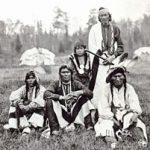 were visited by missionaries Charles Raymbaut and Isaac Jogues, who found them at the Sault and at war with a people to the west, who were probably the Sioux. Because they kept to themselves, away from the frontier, the Chippewa took a very small part in the early colonial wars, but the southern division of the tribe was known to be of warlike disposition. Those to the north of Lake Superior were considered to be peaceful. They were termed by their southern brothers as “the rabbits.” In the north, the members of the tribe were described as the “men of the thick woods” and the “swamp people,” terms used to designate the nature of the country they lived in.
were visited by missionaries Charles Raymbaut and Isaac Jogues, who found them at the Sault and at war with a people to the west, who were probably the Sioux. Because they kept to themselves, away from the frontier, the Chippewa took a very small part in the early colonial wars, but the southern division of the tribe was known to be of warlike disposition. Those to the north of Lake Superior were considered to be peaceful. They were termed by their southern brothers as “the rabbits.” In the north, the members of the tribe were described as the “men of the thick woods” and the “swamp people,” terms used to designate the nature of the country they lived in.
The Chippewa people living south of Lake Superior in the late 1600s were fishermen and hunters. They also grew corn and wild rice. Their possession of wild-rice fields was one of the chief causes of their wars with the Dakota, Fox, and other nations. At about this time, they came into possession of firearms, and began pushing their way westward, in a mixture at peace and war with the Sioux but in almost constant conflict with the Fox tribe. The French, in 1692, reestablished a trading post at Shaugawaumikong, now La Pointe Island, Wisconsin, which became an important Chippewa settlement. In the beginning of the 18th century the Chippewa succeeded in driving the Fox, already reduced by war with the French, from north Wisconsin, compelling them to take refuge with the Sac.
The Chippewa took part with the other tribes of the northwest in all the wars against the frontier settlements to 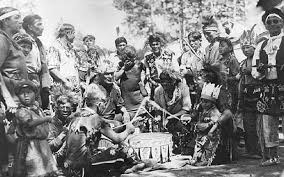 the close of the war of 1812. Those living within the United States made a treaty with the Government in 1815, and afterwards remained peaceful, residing on reservations or allotted lands within their original territory in Michigan, Wisconsin, Minnesota, and North Dakota. By 1900, the Chippewa were estimated to number about 30,000. Today, the collective bands of Chippewa or Ojibwe, are one of the largest groups of Native American People on the North American continent. There are communities in both Canada and the United States. In Canada, they are the second largest population among First Nations, surpassed only by the Cree. In the United States, they have the fourth largest population among Native American tribes, surpassed only by the Navajo, Cherokee and Lakota Sioux.
the close of the war of 1812. Those living within the United States made a treaty with the Government in 1815, and afterwards remained peaceful, residing on reservations or allotted lands within their original territory in Michigan, Wisconsin, Minnesota, and North Dakota. By 1900, the Chippewa were estimated to number about 30,000. Today, the collective bands of Chippewa or Ojibwe, are one of the largest groups of Native American People on the North American continent. There are communities in both Canada and the United States. In Canada, they are the second largest population among First Nations, surpassed only by the Cree. In the United States, they have the fourth largest population among Native American tribes, surpassed only by the Navajo, Cherokee and Lakota Sioux.
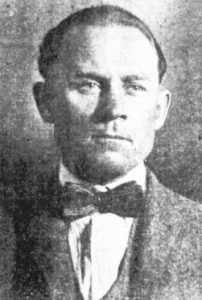 The Spencer ancestry is riddled with names that have been passed down from generation to generation. So much so, in fact, that it can get confusing when researching one’s ancestry. Common names are William, Robert, Thomas, John, Allen, and Christopher. My dad’s family was no different than any other of the Spencer families. The boys in the family were William, named after his grandfather, William, who had a great grandfather named William, and many more I’m sure. My dad was Allen, who was named after his dad Allen, who was named after his grandfather Allen. And many of the children also used those same names, so there were cousins named William and Allen too. Most of the time it only created problems with the ancestry, mail, school things, and such, but when a man named Ethan Allen Spencer (relation, I’m sure, but just how I don’t know) decided that he needed a little bit of excitement in his life, he decided to go from a law-abiding farm family background to becoming a bank and train robber. Ethan Allen “Al” Spencer was born the day after Christmas in 1887 near Lenepah in Nowata County. He came from a law-abiding farm family. He married and soon was the father of a baby girl. So, why would he abandon all that to become a criminal.
The Spencer ancestry is riddled with names that have been passed down from generation to generation. So much so, in fact, that it can get confusing when researching one’s ancestry. Common names are William, Robert, Thomas, John, Allen, and Christopher. My dad’s family was no different than any other of the Spencer families. The boys in the family were William, named after his grandfather, William, who had a great grandfather named William, and many more I’m sure. My dad was Allen, who was named after his dad Allen, who was named after his grandfather Allen. And many of the children also used those same names, so there were cousins named William and Allen too. Most of the time it only created problems with the ancestry, mail, school things, and such, but when a man named Ethan Allen Spencer (relation, I’m sure, but just how I don’t know) decided that he needed a little bit of excitement in his life, he decided to go from a law-abiding farm family background to becoming a bank and train robber. Ethan Allen “Al” Spencer was born the day after Christmas in 1887 near Lenepah in Nowata County. He came from a law-abiding farm family. He married and soon was the father of a baby girl. So, why would he abandon all that to become a criminal.
“Al” Spencer became a criminal as the era of horseback riding was coming to an end, and modern motorized criminals were just getting started. That fact, made Spencer an almost forgotten outlaw. Spencer began his career in crime by getting caught stealing cattle in his early 30s. Then in 1919, he and two men burglarized a clothing store in Neodesha, Kansas. Detectives recovered most of the stolen property and arrested Spencer in La Junta, Colorado. The Kansas court convicted and sentenced him to five years in prison. Then the Oklahoma authorities gained custody of Spencer so they could try him on charges of cattle theft. Spencer pleaded guilty and was sentenced to three to 10 years in the Oklahoma penitentiary at McAlester. He began serving his sentence in March 1920. If you ask me, he should have stuck to farming, because he wasn’t very good at crime. Spencer became friends with another convict named Henry Wells and learned a great deal about crime…becoming better, I suppose…at least as long has Wells was with him. In the 1920s, it was not unusual for Oklahoma governors to grant convicts a leave of absence from prison…even some convicted of major crimes. Spencer was given leave on July 26, 1921, to attend to “some family business” supposedly. He returned to McAlester a month later and became a trustee and was trained to be an electrician. Early in 1922, he was assigned to do electrical work outside the prison in someone’s home. He completed the work, but then he packed up his tools and didn’t return to the prison.
Within a month, Spencer had hooked up with Silas Meigs, who had escaped in a similar fashion from the prison. The pair robbed the American National Bank at Pawhuska, making a “major” haul of $147. Soon the two men robbed a bank at Broken Bow, and this one netted a little more profit. They escaped with between $7,000 and $8,500. They forced a motorist to take them three miles north of town where they had left two horses. The robbers rode away. A few days later Meigs was killed in a gun battle with lawmen northwest of Bartlesville, where he had gone to visit his brother. Spencer remained hidden in the Osage Hills, a vast stretch of country with timber, rocky canyons and thickets of almost impenetrable scrub oak. Friends and relatives brought him food. Spencer later joined up with Henry Wells and two other criminals and robbed a bank at Pineville in 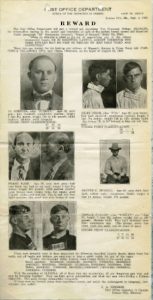 southwest Missouri. Spencer soon hopped a freight train bound for Oklahoma. Spencer found three other men to help him burglarize a store in Ochelata south of Bartlesville. They were surprised by the town’s night marshal who was shot and killed before the outlaws fled in a car. On June 16, Spencer and another man robbed the Elgin State Bank in Chautauqua County, Kansas. They fled with about $2,000 in cash and $20,000 in bonds.
southwest Missouri. Spencer soon hopped a freight train bound for Oklahoma. Spencer found three other men to help him burglarize a store in Ochelata south of Bartlesville. They were surprised by the town’s night marshal who was shot and killed before the outlaws fled in a car. On June 16, Spencer and another man robbed the Elgin State Bank in Chautauqua County, Kansas. They fled with about $2,000 in cash and $20,000 in bonds.
Exactly how many banks were robbed by Ethan Allen “Al” Spencer during the eighteen months following his escape is not known. Evidence suggests he probably robbed at least 20 banks in Oklahoma, Kansas, Missouri and Arkansas. The end of his crime spree came on a Saturday evening, September 15, 1923, when he was shot and killed. There is, however, debate on just how he was killed. U.S. Marshal Alva McDonald, a veteran lawman and personal friend of Teddy Roosevelt, claimed he and other lawmen shot Spencer just south of Caney, Kansas. Another account reported that Spencer was killed about five miles north of Coffeyville, Kansas. The third account came from outlaw Henry Wells’ autobiography. Wells claims that Stanley Snyder, a friend of Spencer’s, killed the outlaw with a shotgun while Spencer was eating supper. Some friend he must have been, but then I guess there is no honor among thieves. Al Spencer’s outlaw days were over, nevertheless, and a new breed of bad men soon took his place using only automobiles. Spencer was the last major Oklahoma outlaw to use horses in his crimes.
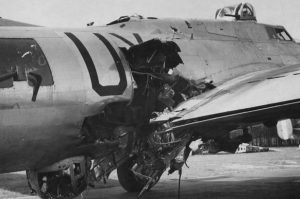
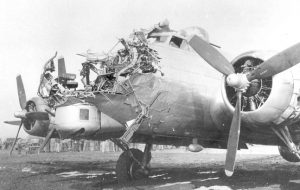 My dad was the top turret gunner and flight engineer on a B-17G Fortress Heavy Bomber during World War II. That was something that my family always knew. Dad didn’t talk much about it, but we were always very proud of him. What we didn’t know about all of that was that my dad was on the toughest plane ever built. At the time of his service, this little known fact probably wouldn’t have brought much comfort to his parents or siblings, but now, all these years later, it somehow brings a good measure of comfort to my dad’s daughter…me. My dad made it home from the war, of course. I know that there were times that his plane sustained damage, but it always brought the crew home.
My dad was the top turret gunner and flight engineer on a B-17G Fortress Heavy Bomber during World War II. That was something that my family always knew. Dad didn’t talk much about it, but we were always very proud of him. What we didn’t know about all of that was that my dad was on the toughest plane ever built. At the time of his service, this little known fact probably wouldn’t have brought much comfort to his parents or siblings, but now, all these years later, it somehow brings a good measure of comfort to my dad’s daughter…me. My dad made it home from the war, of course. I know that there were times that his plane sustained damage, but it always brought the crew home.
The testing of the B-17 Bomber, as is the case with most planes was rigorous. Is this great trial, the B-17 Flying Fortress put up one of most impressive displays, proving not only an effective carrier of firepower in which the plane delivered over a 3rd of the ordnance dropped by the allies in Europe and much of the ordnance dropped in the Pacific, but an astoundingly tough plane. Pilots and crews soon learned that the B-17s, which flew tens of thousands of missions under heavy anti-aircraft and fighter-plane pressure, could take extraordinary damage and still get home.
During the war years, the B-17s proved time and time again just what a wonderful plane they were. While they may not have brought their entire crew home every time they returned, they came home with part of them even with parts of the nose, propellers, and wings missing…and even with a tail that was hanging on by a thread. Of course, if the wing was torn completely off or the plane took a hit that ripped it in half, it did go down, but that is to be expected, as was the case with B-17G-15-BO “Wee Willie,” 322d BS, 91st BG, after direct flak hit on her 128th mission.
Still, the condition in which some of these planes came home would have shocked the builder altogether, if you ask me. I have looked at the pictures of these damaged planes, and I don’t know how they stayed in flight. The 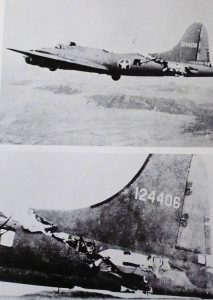
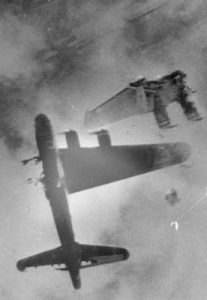 “All American,” with the 97th Bomber Group, made without a doubt, the most astonishing return. The plane had a huge gash in it’s tail section from a collision with an enemy fighter, whose wing sliced almost completely through the fuselage. The tail gunner was trapped at the rear of the plane because the floor connecting his section to the rest of the plane was gone. The plane was piloted by Lieutenant Kendrick Bragg, who flew 90 minutes back to base with the tail barely hanging on. One crew member said that the tail wagged like a dog’s tail. The pilot, proceeded to drop his bombs, and then made a U-turn taking the plane in a wide turn over 70 miles, so as not to stress the tail. When the plane landed and came to a complete stop, the tail finally broke off. Now that is one tough plane!!
“All American,” with the 97th Bomber Group, made without a doubt, the most astonishing return. The plane had a huge gash in it’s tail section from a collision with an enemy fighter, whose wing sliced almost completely through the fuselage. The tail gunner was trapped at the rear of the plane because the floor connecting his section to the rest of the plane was gone. The plane was piloted by Lieutenant Kendrick Bragg, who flew 90 minutes back to base with the tail barely hanging on. One crew member said that the tail wagged like a dog’s tail. The pilot, proceeded to drop his bombs, and then made a U-turn taking the plane in a wide turn over 70 miles, so as not to stress the tail. When the plane landed and came to a complete stop, the tail finally broke off. Now that is one tough plane!!

